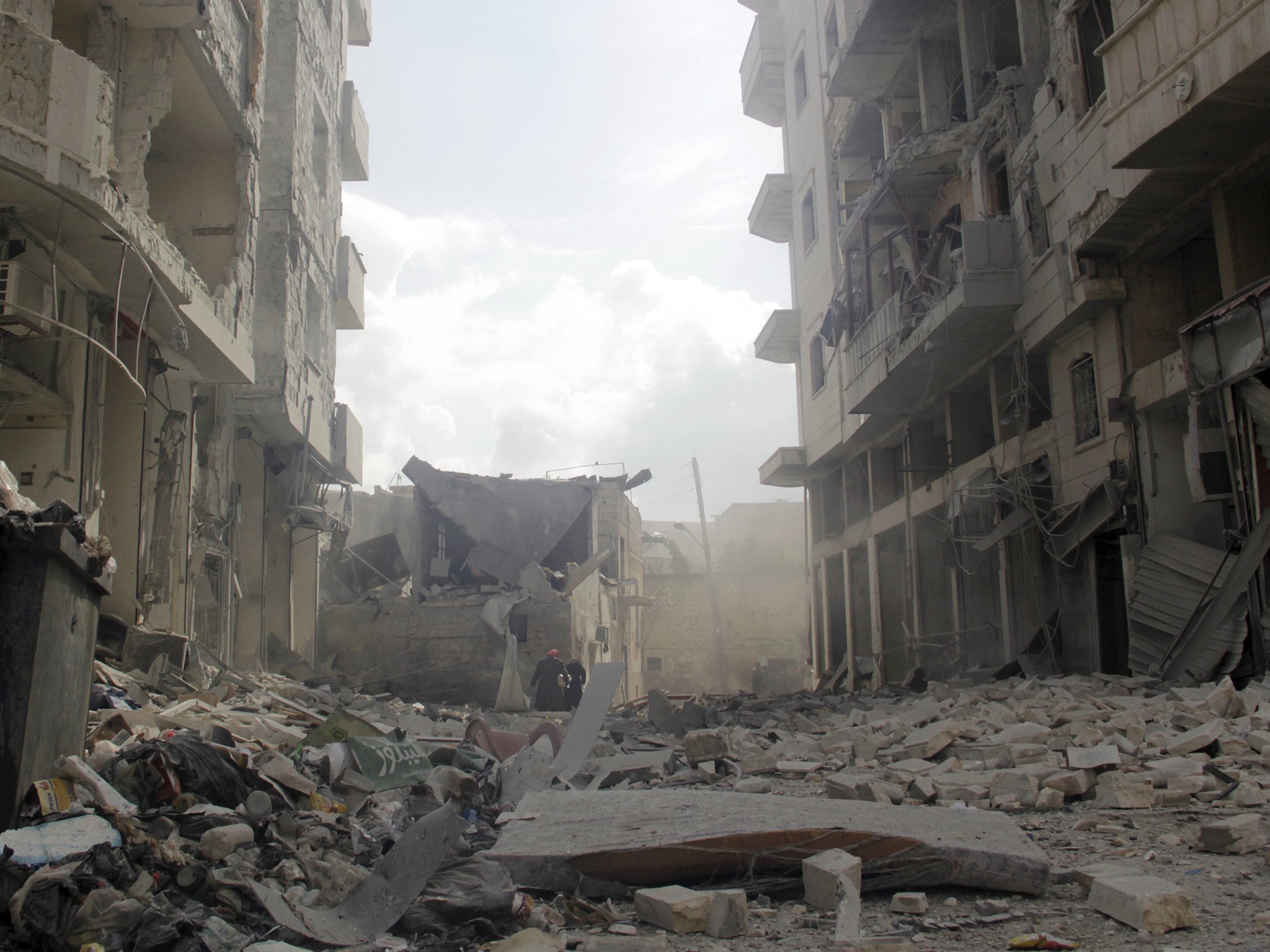Syria conflict: Government again accused of using chemical weapons on civilians as villagers are treated following gas attacks
Human Rights Watch claims it has evidence that 'strongly suggests' toxic barrel bombs dropped by helicopters in March have affected 206 people

The Syrian government has been accused of again using chemical weapons against civilians as fighting intensifies with fresh rebel attacks in the north of the country.
Helicopters deployed by the regime of Bashar al-Assad dropped barrel bombs containing gas canisters filled with lethal chemicals in and around the city of Idlib, west of Aleppo, as it was assaulted and later captured by jihadi forces led by the al-Qaeda affiliate, Jabhat al-Nusra, in March according to Human Rights Watch.
The group said it had evidence strongly suggesting that toxic chemicals dropped by helicopters between 16 and 31 March affected 206 people, with one attack killing six people, including three children.
The accusation came as rebels in Aleppo blew up a Syrian air force intelligence headquarters by exploding a powerful bomb packed into a tunnel dug secretly beneath it. The Syrian Observatory for Human Rights says that more than 20 government troops and fighters were killed and wounded in the blast, along with 13 rebels. The rebels are also making advances north of Aleppo where they earlier repelled a government counter-offensive.
Rescue workers and doctors in Idlib said that the bombs alleged to have contained the chemicals did not detonate when they landed, but there was a strong smell of chlorine. Dr Mohammed Ghaleb Tirani, the director of a field hospital in Sarmin six miles south east from Idlib city, treated six members of the Talib family, including three infants, found in a basement. He said “Aioush [Talib, the grandmother], 65, died before arriving at the hospital. We tried to treat the others. The children were foaming at the mouth, they were suffocating, then their hearts stopped. The parents had trouble breathing. We tried to treat them, but they died as well.”
Muhammad Yazan, a local activist, told HRW that he had gone to where two barrel bombs had landed in a field on 16 March but there was no explosion. Soon afterwards, 30 civilians and 40 rebel fighters were affected and sought treatment in hospital. “There was a very strong chlorine smell there,” said Mr Yazan. “One of our team members passed out. It was horrible. My eyes were burning. I wanted to throw up. My skin felt like I had rashes.”
The Syrian air force is notorious for responding to rebel attacks by indiscriminate bombing of any area it believes to be in rebel hands. The barrel bombs normally contain explosives and scrap metal, but in this case there is strong evidence that chlorine gas canisters were employed.
The use of poison of gas may be a measure of Syrian desperation as between 4,000 and 5,000 Jabhat al-Nusra fighters captured Idlib, long a government stronghold in a rebel-held area and only the second out of 14 Syrian provincial capitals to be lost by government forces.
After the city’s fall on 28 March, Syrian helicopters are alleged to have dropped bombs on the city itself. Leith Fares, a civil defence worker, said that he reached the place where a barrel bomb had fallen in the street, where he saw remains of “refrigerant gas canisters and bottles filled with red liquid”. An opposition journalist said he saw several gas canisters with yellow gas leaking from one.
Jabhat al-Nusra and other opposition groups such as Ahrar al-Sham have been on the offensive in Idlib and Aleppo in recent weeks. They are reported to have received strong support from Turkey, whose frontier is to the north, and fresh supplies of weapons funded by Saudi Arabia.
With Jabhat al-Nusra making advances in the north and Islamic Fighters taking over most of Yarmouk Palestinian Camp, the government has suffered a series of reverses. Both Isis and Jabhat al-Nusra are growing in strength and the Syrian army is finding it difficult to keep up its numbers after four years of war. Despite a shortage of recruits, it is, however, expected to launch a counter-offensive to recapture Idlib.
Meanwhile, Isis has been pushing westwards to cut the Syrian army’s supply lines to Aleppo from the south. As the fighting intensifies the government is likely to use any weapon it can get its hands on, including chemical weapons.
Join our commenting forum
Join thought-provoking conversations, follow other Independent readers and see their replies
Comments